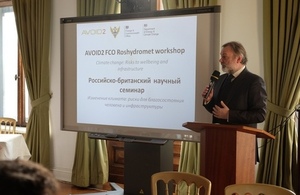"Climate change: Risks to human wellbeing and infrastructure" workshop in Russia
UK Embassy in Moscow hosted a successful workshop on climate risks, where UK and Russian scientists announce plans to work more closely together on climate change research.

The workshop was held on March 19, 2015 and was attended by representatives from AVOID 2 (UK government funded climate change research programme involving a multi-disciplinary consortium of UK research organisations) and RosHydroMet, the Russian Federal Service for Hydrometeorology and Environmental Monitoring, as well as UK and Russian government organisations. Discussions covered the risks, impacts and costs associated with climate change, as well as options for adaptation and mitigation.
Speakers at the event outlined the regional impacts that could be expected in Russia as a result of climate change. The workshop also focused on the role of changes in the high latitudes, and potential global impacts. Feedback processes occurring at high latitudes as a result of increasing temperatures have the potential to amplify climate change.
Following on from the workshop UK and Russian scientists will work more closely together to assess climate change impacts for particularly significant sectors or regions within Russia using AVOID 2 climate scenarios. They will also look to assess the implications of a changing climate for soil and vegetation carbon sources and sinks using AVOID 2 scenarios.
Commenting on the outcomes of the workshop UK and Russian scientists said:
From the presentations of both Russian and UK scientists it is clear that both sides seek to understand climate change in terms of the impacts of more intense or more frequent hydro meteorological events on both natural and socio economic systems. Of course these impacts can be undesirable, dangerous or favourable. UK and Russian scientists have both used data from the CMIP5 project to underpin their assessments of these risks in the UK’s AVOID2 and Russian Second Assessment reports discussed at the seminar. The seminar was therefore undoubtedly a useful platform to exchange fresh scientific information among specialists in this area. (Professor Sergey Semenov, Director of the Institute for Global Climate and Ecology)
An exciting aspect of the workshop was comparing the approaches taken by UK and Russian experts to assess climate change. I look forward to exploring how we can further share this climate expertise in the avoid2 programme and beyond” (Professor Jason Lowe, AVOID2 Chief Scientist).